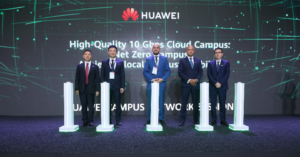Huawei has introduced the Net Zero Campus Framework, which serves as a detailed blueprint for campuses to achieve net zero carbon emissions. Leveraging Huawei’s campus solutions expertise, this framework aids campuses in evaluating their current status and strategizing their shift to clean energy sources, all while catering to the increasing need for digital services and data processing.
Huawei’s vision and mission revolve around making digital technology accessible to every individual, household, and organization to create a fully interconnected and intelligent world. To achieve this goal, Huawei has integrated sustainability as a key priority and seamlessly integrated it into its overarching development strategy.
Huawei was also named as World Summit on the Information Society (WSIS) 2022 champion for its intelligent Net Zero Campus solution at the Yancheng Campus in China. The WSIS event was organized by the ITU, UNESCO, and UNDP.
A net zero energy campus is a campus that generates the same amount of energy it consumes from renewable sources like solar, wind, or biomass, typically over a year. This approach can lower energy expenses, optimize space usage, enhance services and security, promote innovation, and help in creating eco-friendly cities and meeting climate targets.
Huawei was honored by the name of Champion at the World Summit on the Information Society (WSIS) 2022 Forum’s Prizes Ceremony in Geneva for their implementation of the intelligent net-zero carbon campus solution in the Yancheng Low-carbon & Smart Energy Industrial Park project. Among 996 projects in consideration, this recognition came after a five-month selection process.
During a series of sustainability-related sessions by Huawei, Philip Song, the Chief Marketing Officer of Huawei’s Carrier Business Group, elaborated on the topic of green development and outlined practical steps that the company can take to assist operators in constructing more environmentally friendly networks. He emphasized that enhancing energy efficiency can be achieved through actions at the site level, network level, and by adopting greener operational policies and decisions.
Digitalization is a powerful force for innovation and change on a global scale, playing a crucial role in assessing a nation’s overall capability and modernization. Smart cities, which reflect a country’s digital approach, are essential for enhancing competitiveness. Campuses play a foundational role in city infrastructure and act as real-world test sites for leading cities to advance towards smart city status. Regional governments are proactively establishing intelligent campuses, integrating innovative, sustainable, net-zero carbon, adaptable, and people-centric principles within ambitious smart city initiatives.
At GITEX GLOBAL 2023, David Shi, President of Huawei’s Enterprise Business Group for the Middle East & Central Asia, and Li Ying, Vice President of Huawei Enterprise Marketing & Solutions Sales, unveiled the Future Net Zero Intelligent Campus white paper, which discusses the trajectory of intelligent campuses, their characteristics, and the framework for net zero intelligent campuses. The paper explores how these campuses can drive economic development, achieve zero-carbon objectives, and contribute to a fully interconnected intelligent world.











